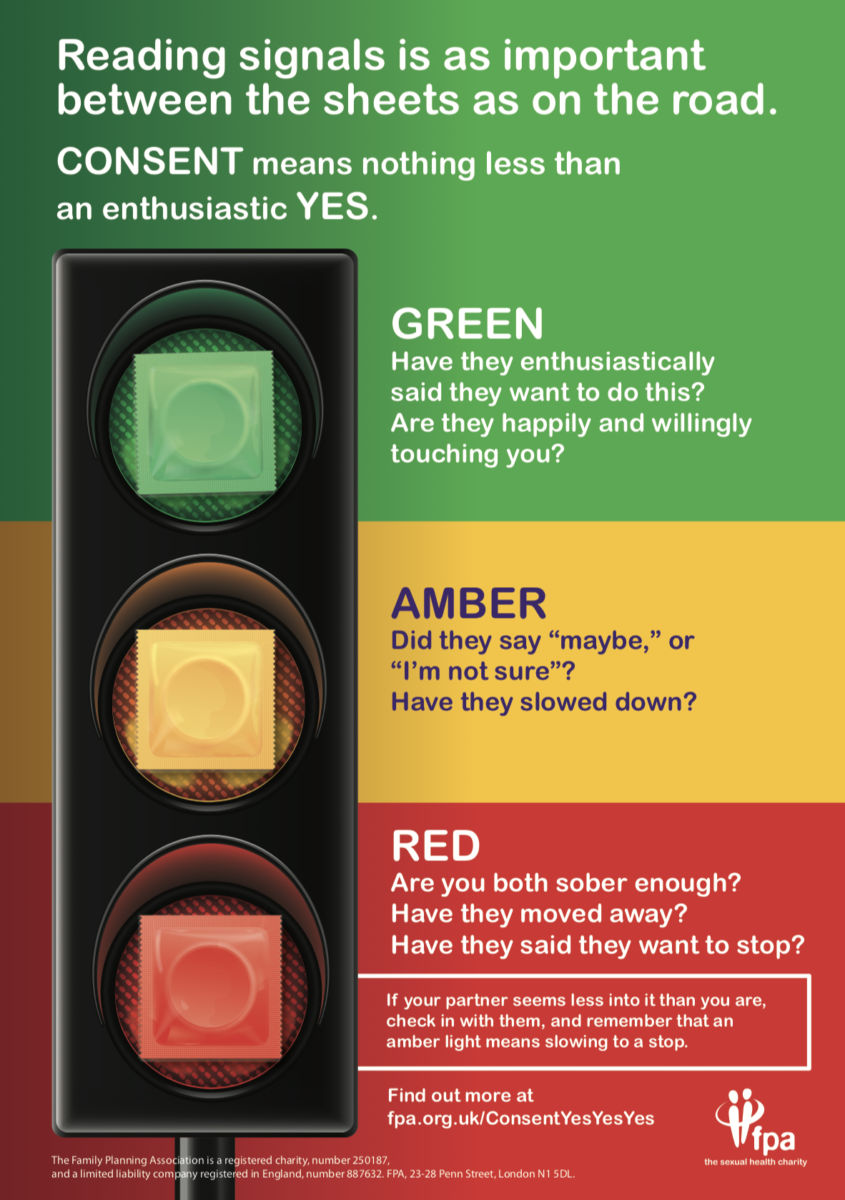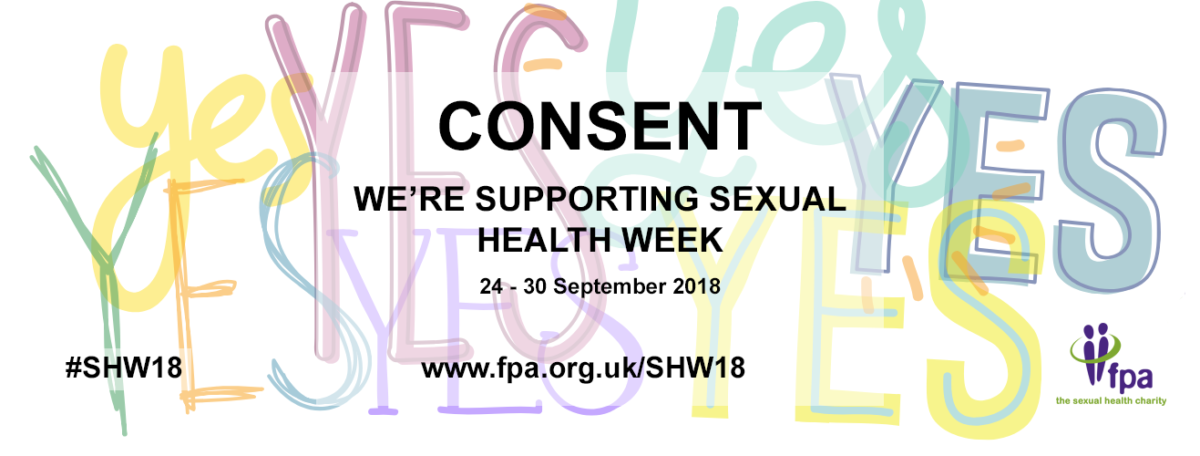
Yesterday marked the beginning of Sexual Health Week 2018 – an annual campaign run by sexual health charity FPA to help raise awareness of various issues within sexual health. This year’s theme is consent, and judging by the research released by FPA today, we’re in urgent need of more education and information surrounding consent.
Over the last year or two, we’ve been having plenty of public discussions around consent: from the revelations of the #MeToo movement, which have highlighted just how much work there is still to do, to campaigns pushing for better consent education as part of Sex Education at school, you’d expect most people to be more aware of the importance of consent in sexual interactions. However, to mark the start of Sexual Health Week, FPA surveyed 2000 people about their attitudes towards consent, and some of the results were very concerning:
– Just under half of those surveyed (47%) did not think it was OK to withdraw consent if they were already naked.
– Only 13% of people said they would be most likely to discuss issues of consent with a partner.
– 9% of people don’t think it is OK to withdraw consent if they have been bought dinner/drinks, or if they have previously engaged in other sexual activity with a person (i.e. kissing, previous sex, getting naked together)
What’s wrong with this picture?
It is always okay to withdraw consent for a sexual interaction.
No matter what the interaction is, whether you’ve done it before, whether the person you’re with really really wants to, and how far along a particular path you are. Sometimes things just don’t feel right, sometimes you change your mind, sometimes what seemed like a fun game turns into something that feels pressured or uncomfortable: you are always allowed to say ‘no.’ And it should go without saying that a ‘no’ should always be respected.
But the sheer number of people who are still unsure about this means there’s lots of work on consent education still to do. Natika Halil, Chief Executive of the sexual health charity FPA said:
“It’s been encouraging to see the cultural shift in society over the past year, with calls for better understanding of and respect for consent. But it’s really worrying that people of all ages think that it’s not okay to withdraw consent in a range of situations. It’s always okay to say no to sexual activity that you’re not comfortable with, whatever the situation – and is equally important to listen to and respect your partner if they want to stop.
“We want Sexual Health Week to provide a starting point for these conversations, addressing the basics and helping people feel more confident recognising, discussing and negotiating consent.”

How do we educate people about consent?
For the vast majority of us who are adults today, consent was not a key focus in our sex education at school. So one of the key aims of sex educators today is to ensure that consent is included on the sex education curriculum: young people need to be taught the basics:
- that it is okay to say ‘no’
- that sexual activity should be something you do with someone, not to them
- you should be aware of all the factors that can influence someone’s capacity to consent including (but not limited to) alcohol or drugs, power imbalances, peer pressure, and many more
The FPA survey of 2,000 people for Sexual Health Week 2018 (PDF) revealed that 38% of people learnt about consent from TV and film.
Yet so often, what’s presented as romantic and desirable behaviour in a Hollywood sex scene, is anything but.
Good film examples of negotiating consent…
10 THINGS I HATE ABOUT YOU
Throwing it back to 1999’s favourite rom-com with Julia Stiles’ angsty teen feminist Kat Stratford and Heath Ledger’s dreamy Patrick Verona, a core element of this movie revolves around attitudes towards sex and dating. When Kat gets too drunk at a party and Patrick drives her home, she leans in for a kiss at the end of the night. He rebuffs her, knowing it wouldn’t be right to take advantage of this moment because she’s too intoxicated to freely give her consent.
Later, Kat explains to younger sister Bianca that the reason she doesn’t like the boy Bianca is dating is that Kat had previously had sex with him, after giving in to peer pressure, and he’d treated her badly when she regretted it.
Nearly 20 years on it’s still a fun, coming-of-age movie, with some great messages hidden in there.
SCOTT PILGRIM VS THE WORLD
A great example of respecting someone’s right to change their mind about consent is a scene in Scott Pilgrim vs The World.
Scott Pilgrim and his girlfriend Ramona are kissing in bed and appear to be leading up to sex. Halfway through, Ramona stops and says “I changed my mind… I don’t want to have sex with you, not right now”. She’s clear that she reserves the right to change her mind about it and have sex at another time. He responds “OK, well this is nice. Just this” and immediately accepts how she feels without pressuring or questioning her, or making her feel guilty. This is a perfectly kind and sweet way to respond when someone withdraws consent.
Less than stellar film examples of negotiating consent…
THE NOTEBOOK
As much as this might surprise people, as in so many ways it’s considered the ultimate love story, Noah is not the perfect gentleman throughout.
In trying to convince Ally to go on a date with him, Noah uses coercive tactics. He is persistent and pressuring when he climbs a ferris wheel at the fairground and threatens to let go if she doesn’t go on a date with him, despite her previous disinterest. This dramatic gesture and inability to take “no” as an answer – minus Ryan Gosling as distraction – is actually harassment and coercion.
STAR WARS: THE EMPIRE STRIKES BACK
Early in the film when there’s turbulence in the spaceship which causes Princess Leia to fall into Han Solo’s lap, she has to ask three times for him to let her go, after which he sarcastically chides her “sorry sweetheart, I don’t have time for anything else.”
Later in the film, he forces a kiss upon her. Han approaches Leia from behind while she’s working and puts his arms around her, to which she physically shoves him backwards away from her. He begins rubbing her hands when she asks him not to, and backs her into a corner with nowhere to escape. He even notices that she’s trembling, but continues and kisses her in the middle of her sentence. Leia sneaks away as soon as the kiss is interrupted.
There’s no evidence here that Leia wants or invites any of Han’s advances, but he ignores her verbal and non-verbal cues and continues anyway.
And finally, seeing as this week is Sexual Health Week, Sex Toy brand, Hot Octopuss will be writing and talking about consent over on the hashtag #SHW2018: check out the information provided, join in the discussion, share the FPA resources, and talk to the people in your life about consent – how to make sure that they have it before starting a sexual interaction, and understanding that it can be withdrawn at any time.
To promote Sexual Health Week and support the work of FPA, this week Hot Octopuss are offering a 20% discount on any of their products – PULSE III, the Queen Bee, Atom cock ringsand Pocket Pulse – if you use the code FPA20 – 5% of sales will go directly to sexual health charity FPA. https://www.fpa.org.uk/

This post was written in collaboration with:




